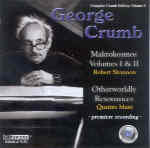George Crumb’s recent outpouring of new compositions not only has been among the most gratifying phenomena in contemporary music, but it also has allowed Bridge to mingle older works with new material. And so what began as something of a retrospective edition now has turned into a thrilling adventure into the unknown, not to mention a loving tribute to one of America’s very greatest composers. Otherworldly Resonances for Two Amplified Pianos, composed for the remarkable piano duo Quattro Mani (Susan Grace and Alice Rybak), takes a tiny four-note theme as an ostinato and for the next 10 minutes superimposes virtually every haunting, “extended technique” sound that Crumb knows how to make. The result is a classic crumb of Crumb, if you will forgive the expression–actually, it’s more like a chunk than a crumb, but I just couldn’t resist. It goes without saying that Quattro Mani plays the piece to the manner born.
Makrokosmos for Amplified Piano, which dates from the early 1970s, aptly begins a bit like Bartók’s Sonata for Two Pianos and Percussion (including a suprise fortissimo near the start that will scare the living daylights out of you), then proceeds to boldly go where no piano, amplified or not, has gone before. Consisting of two books of 12 pieces, each named after a sign of the Zodiac, it comprises a whole new universe of evocative sounds, from simple chords and tunes to the birdsong and bell imitations we find in so many other Crumb works. Robert Shannon’s performance is simply the last word in sensitivity and excitement. Whether attacking the piano from the inside, as in The Phantom Gondolier or Music of Shadows, or whistling and singing (Voices from “Corona Borealis” and Agnus Dei, respectively), not only has he mastered the idiom, but it’s all integrated with complete naturalness into a coherent sound picture, projecting each piece with organic spontaneity. And let’s not forget the sheer virtuosity in such passages as Tora!Tora!Tora! (Cadenze Apocalittica), or the delicacy of Pastorale and Morning Music. I could go on, but I’m sure you get the picture. This is an astounding performance, wholly gripping and a joy from beginning to end.
Equally thrilling are the sonics, which set a whole new standard in this music. Every rustle, swoosh, crunch, tinkle, crash, scrape, and thud, every nuance of overtones or pregnant pause is captured with vivid immediacy and with a huge but always natural dynamic range against an ideally silent background. Purely on technical consideration alone, I would have to consider this one of the best recordings that I have ever heard. There’s absolutely no conscious sense of the electronics at work (check out Cosmic Wind, Book 2 No. 9), but merely the enlarged expressive range of what sounds like an entirely new instrument, making all the more remarkable the idea that a single player (or composer) is responsible for this glittering universe of new timbres. I have been praising this series with what might appear to some as tiresome regularity, but it’s not just because I think Crumb is “important”. His output is vital, beautiful, and challenging for sure, but it’s always rewarding–and not, in the final analysis, terribly difficult for the listener who delights in the tactile qualities of music and the dramatic possibilities of a language of timbres and gestures, as much as tunes and chords. Once over that initial hurdle, Crumb’s music, not to mention this disc, becomes a marvel. Savor it!
































